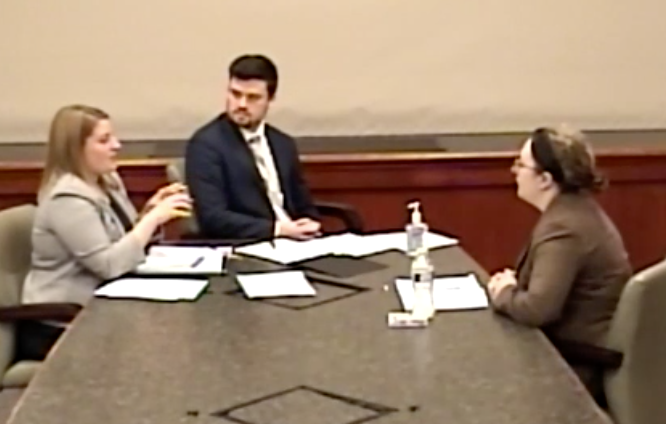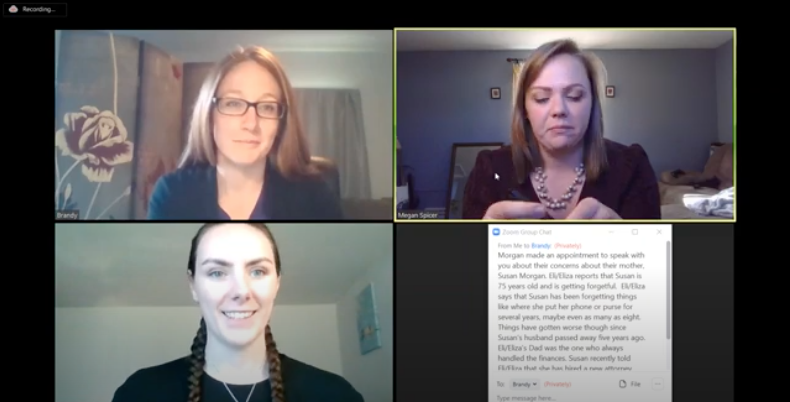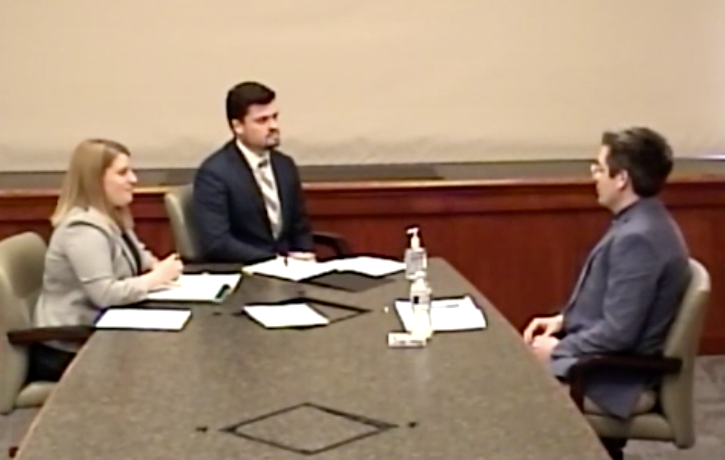Virtual Competition via Zoom: Feedback from Competitors, Judges and Coaches!
Competitors' Perspectives:
When law schools transitioned to online learning, everyone expected all competitions would end for the year, and competitors would be unable to compete in the remaining regional and national competitions. Quinnipiac University School of Law, however, decided to move forward and host the ABA National Client Counseling Competition to allow the regional winners to showcase their skills and hard work in one final competition. While competitors agreed that this was a completely unexpected transition, they thought it reflected the reality of practicing in the ever changing legal field.
Peter Johnson from Stetson University College of Law said that he thinks “[v]ideo conferencing will be an ever-increasing part of the legal profession as technology improves and more legal professionals become comfortable with using the platforms. Competitions should reflect the realities of law practice and using video conferencing in competition will prepare us better for using the technology in practice.” Other competitors agreed that video conferencing will likely play a more prominent role in the legal profession and said that this competition provided them with an experience that will enable them to be innovative and more productive when in-person meetings may not be possible for any number of reasons.
The competition was not, however, without its challenges. Mr. Johnson explained that when it comes to interviewing a client virtually, “[y]ou have to change your approach. It is not the same as in-person consultations. There are different challenges and different potential issues that need to be addressed.” One of the biggest issues competitors thought they had to overcome was building rapport with their clients. When interviewing a client, the non-verbal cues that a client or even your co-counsel may be sending are much easier to read in person than over video. For example, it can be hard to tell if someone is fidgeting with their hands uncomfortably if the video doesn't show their hands. In other words, according to Mr. Johnson, “the impersonal nature of Zoom conferencing meant that it took a little bit longer to establish rapport and put the client at ease.”
Another major challenge faced by competitors during the online competition was the technology. Depending on internet connections and download speeds, there can be a lag in Zoom videos, or even videos or audio freezing completely. This posed a unique problem for a client interviews because, as Mr. Johnson noted, it was “very easy to talk over each other” if the video or audio cut out or froze. His advice was to “say upfront that the audio or video may cut out, but the client can let you know that it has and to not hesitate to ask to hear something again. Because of the risk of technology cutting out, it is helpful to use more concise explanations rather than explain something for a couple minutes.”
Even with these challenges, competitors agreed that a great way to move forward with future competitions, would be to hold part of a competition in-person, but also give students the opportunity to do some of it online. This would promote one of the main goals of law school competitions, which is to give students real-life experiences in lawyering skills, including the innovative use of technology.
Judges' Perspectives:
Judges for this online competition came from a variety of backgrounds, including practicing attorneys, retired judges, mental health professionals and social workers. Most competition judges reported they would have preferred the competition to have been live instead of virtual. When live, it is much easier for the attorneys and client to build rapport and recognize verbal and nonverbal signals; for judges to take notes on a laptop or in person; and generally, for a better process. The judges all acknowledged, however, that there were some benefits that the virtual competition provided both competitors and judges.
One judge, Jennifer Luise-Champagne, MA, LPC, said that “it may be more cost-effective for the schools to be able to continue to participate in this manner, as it would reduce travel and related expenses.” She added that it may open the opportunity to more students to have the ability to compete. Another judge, Attorney Ellin Grenger, said that, “this is a realistic competition style, and should be worked in as at least a module in future competitions. I am certain COVID 19 will likely lead to industry changes.” Judges agreed that the online competition was very convenient and saved a lot of travel time. Also, Zoom allowed the judges to remain muted with their cameras off, so competitors were able to focus on the competition rather than the judges.
One of the biggest challenges the judges faced was adjusting to using Zoom technology. Sometimes there was a delay, and audio was not always clear. Ms. Luise-Champagne said “one of the teams acknowledged the limitations of the zoom process right at the outset. I thought that was great because it helped everyone to be mindful of that.”
Tips from judges for anyone who has not judged virtually:
Don't decline doing it just because it's unfamiliar.
Keep in mind that organizers and competitors have spent a lot of time on preparation and logistics.
Be sure to test your devices in advance; have a back up plan; and keep some water, tissues, etc., nearby.
Finally, remember you are on camera, and what's behind you is also visible to others on Zoom!
A Coach's Perspective:
When the ABA National Client Counseling Competition moved to an online format, Coach Chelsea Vetre stepped up and helped prepare her team for a very different competition than any of them were expecting. Ms. Vetre noted that, while it was unusual and there were many challenges they faced along the way, “the core values I implement while coaching continued. Zoom made it incredibly easy to give real time feedback to my competitors and gave us the ability to connect at any time in any place. Furthermore, we were able to have more productive and longer meetings because the virtuality cut off other time wasting activities, such as driving to the school to practice.”
One challenge observed by coaches was ensuring that competitors did not talk over one another or the client, because Zoom only shows peoples' faces and their full body language cannot be interpreted. The competitors were required to become well acquainted with being comfortable with pauses to ensure the speaker was finished talking and to ensure someone else wasn’t going to begin speaking. Ms. Vetre also noted that during in-person competitions, judges may not always focus on individual competitors’ facial expressions during the entirety of the rounds, merely focusing on the speaker and not the other members in the room. However, in the online competition, “each competitor was laid out on the screen, making them visible and easy to see at all times.” Accordingly, if a competitor made a face or did not have their “game-face” ready at all times, it was easily noticed.
Another challenge was making sure that the client knew that when competitors were looking down, they were just taking notes and not looking away for any other reason, including finding ways to communicate with each other during rounds. There were no pads of paper in between the competitors on which to jot down notes, as would have been the case if the competitors were sitting next to each other. One coaching tip Ms. Vetre said helped her team was having “competitors use shorthand 'codes' for what they wanted to communicate to one another and us[ing] the chat feature to talk to one another.”
The biggest fear coaches and competitors had during the competition was whether or not technology would fail or someone would be left off an invite or email. However, the competition ran smoothly, and coaches and competitors agreed they would be willing to compete virtually again.
Ms. Vetre indicated that the virtual format could be helpful for conducting preliminary rounds in competitions, or intramural rounds, but emphasized that there is an importance in having these competitions in-person for the competitors to connect with and showcase their skills to the judges. She added that, in moving forward and coaching another team, she would suggest that more practices be held virtually. “[W]e do not have to have every single session in-person, and the client does not need to be [physically] present during the sessions. As many know, it can be tough to find a client so having the ability to have everyone, or just the client, hop on Zoom can make life much easier.”
When asked what advice she had for anyone who has not competed or coached virtually before, she counseled, “Be patient. The technology and numerous emails can be overwhelming at times. However, after a few days you will get in the swing of things and it will be effortless and comfortable. Also, even if you have the ability to host in-person practices, try to hold at least 75% via Zoom, so your competitors get the hang of Zoom. It can be very distracting to see a mirrored image of yourself talking on the computer, unlike in an in-person competition, and may take time to get used to.”




